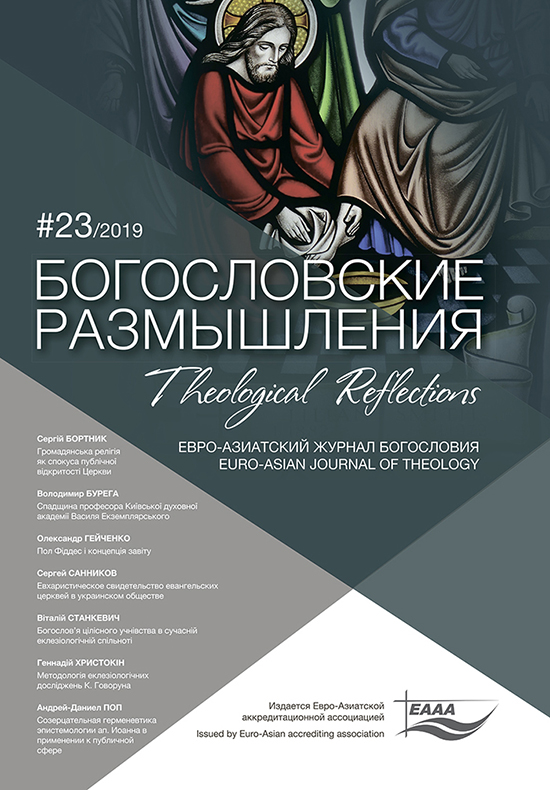The Eucharist as Witness of Evangelical Churches in Ukrainian Post-Secular Society
DOI:
https://doi.org/10.29357/2521-179X.2019.23.04Keywords:
Missio Dei, Eucharistic presence, Joshua Searle, Missio Ecclesiae, evangelical churches.Abstract
Many researchers note an active process of the returning religion to the public sphere. Jürgen Habermas labelled modern societies as postsecular. The public role of the church became especially visible in Ukraine after the Maidan 2014. This is evidenced by national projects to celebrate the 500th anniversary of the Reformation in 2017, and especially by the formation of the Orthodox Church of Ukraine in 2018, as a factor in the Ukrainian identity. In Ukraine, appeared even the concept of “religious security” of the state.
Under these conditions, the classical for the Enlightenment and Modernity principle of the separation of the Church and the State, with a clear dualism between the spiritual and the material, need to be revision. As many researchers have shown, at present, the idea of religious and secular turned out to be not only blurred, but also mutually intersecting.
In the first 20 years of independent Ukrainian history, the missionary program of evangelicalchurches was built on Missio Ecclesiae as an activity to promote their faith and spread their views in order to expand their own organization. A search for a new missionary paradigm based on Missio Dei is currently underway. The place of the Church in this process provokes numerous discussions. Some (eg Leslie Newbegin) believe that the Church is an area of mission and the developing of the Kingdom of God should takes place through the Church enlargement, others (Joshua Searle) indicate that the Church is not the goal, but the instrument with which God establishes His Kingdom. The last point of view is becoming especially popular in the modern evangelical movement.
Searle criticizes the missionary significance of the Eucharist, as well as other church rites, because for him difficult to see any connection between missio Dei and the eucharist. However, the paper shows the groundlessness of this criticism, because An. Paul makes it clear that «as often as ye eat this bread, and drink the cup, ye proclaim the Lord’s death» (1 Cor. 11:26). According to Paul’s thought, the proclamation of the death of Christ takes place when Christians partake the bread and vine. Author shows how the Eucharist supplies the Christian with the necessary strength for testimony through “judgment unto himself”, which leads to repentance and increasing in holiness. Therefore, the purpose of the Eucharist is to renew and strengthen the presence of Christ in the life of the believer for the following mission.
Otherwise, modern calls for the expansion of the kingdom of God as opposed to the expansion of the Church, lead to humanistic activism, which focuses on the active participation of Christians in achieving justice, solidity with the poor and suffering, in developing social activity and so on. All this is important, but breaking the link with the Church such approach leads to weakness of the spiritual life and does not teach the feel and understand the will of God, necessary to participate in Missio Dei.
For the post-secular society, the harmony of preaching and sacrament, as a visible form of faith, becomes especially relevant. The mission should be focused on the person, as a holistic creature. It should affect his soul, spirit and body, preparing him for Eschaton (1 Thess. 5:23).
References
- Newbigin, Lesslie. The Gospel in a Pluralist Society. Wm. B. Eerdmans Publishing, 1989.
- Searle, Joshua T. Theology After Christendom: Forming Prophets for a Post-Christian World. Wipf and Stock Publishers, 2018.
- Барт, Карл. «Барменская декларация. Теологическая декларация о современном положении Германской евангелической церкви». Богомыслие, вып. 22 (2018): 223–25.
- Бош, Дэвид. Преобразования миссионерства. СПб: Библия для всех, 1997.
- Вера и порядок, Лимская декларация. Крещение, Евхаристия, Священство. Женева: ВСЦ, 1982.
- Карев, Александр. «Вечеря Господня. Ее установление и значение». Братский вестник, вып. 2 (1962):13–20.
- Райт, Кристофер. Миссия Бога / Пер. с англ. Черкассы: Коллоквиум, 2015.
- Смыцнюк, Павло. «Извилистая граница: полис, гражданская религия и различие между sacrum и profanum». В Политическое богословие, 16–39. М.: ББИ, 2019.
- Соловьев, Владимир. Сочинения. Т. 2. 2 тт. М.: Мысль, 1988.
- Стамулис, Иаков. Восточно-православное богословие миссии сегодня. М.: Православный Свято-Тихоновский Богословский Институт, 2003.
- Тернер, Брайан. «Религия в постсекулярном обществе». Государство, религия, церковь в России и за рубежом 2 (30), (2012): 21–51.
- Узланер, Дмитрий. «Картография постсекулярного». Отечественные записки 1 (2013): 175–92.
- Хантингтон, Самюэль. Столкновение цивилизаций. М.: АСТ, 2003.
Downloads
How to Cite
Issue
Section
License
Copyright (c) 2020 Sergii SANNIKOV

This work is licensed under a Creative Commons Attribution-NonCommercial 4.0 International License.
All articles published in the Journal are distributed under a Creative Commons Attribution-NonCommercial 4.0 International License
By submitting an article for publication in Theological Reflections: Eastern European Journal of Theology the author grants the editors the right to publish the article and distribute it in electronic and print form.
The author reserves all copyrights and the right to use the materials of the article in whole or in part for educational purposes, to write his own dissertations, to prepare abstracts, conference reports, oral presentations, etc., as well as post electronic copies of articles (including the final electronic version downloaded from the journal’s official website) on non-commercial web-resources without the consent of the editorial board and founders.



